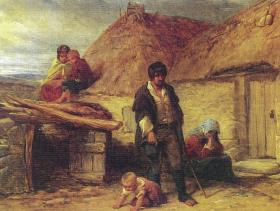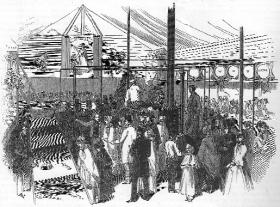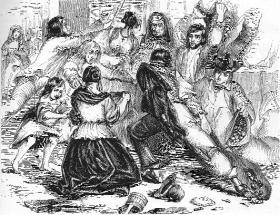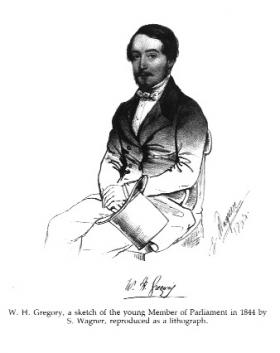The Great Famine general election of 1847
Published in 18th-19th Century Social Perspectives, 18th–19th - Century History, Features, General, Issue 5 (Sep/Oct 2009), The Famine, Volume 17
An Irish Eviction (1850) by Frederick Goodall. During the Famine mass evictions led to forced emigration. (Leicester Museum & Art Gallery)
The ultimate responsibility for failure to cope effectively with the disaster of the Famine lay with the Westminster parliament, but we should remember that Ireland in 1847 returned 105 MPs to Westminster. A unified effort by all these MPs could have changed government policies. No such agreed approach emerged and there was a serious failure among Irish politicians and electors to respond to the ongoing crisis in a meaningful way.
Famine
The context of the ongoing famine in August 1847 must be appreciated. The Great Famine had begun in the second half of 1845. Failure of the potato crop that year and the following led to massive loss of life and forced emigration. By the summer of 1847, however, it seemed that the worst was over. In July/August the Irish press carried many glowing reports of good harvests. Unfortunately, the crops planted were small in quantity, and severe suffering would ensue in late 1847 and into 1848. Blight would return again in 1848 and 1849 with terrible consequences.
Different measures, public and private, were taken during these five years to combat the Famine, but many of these proved very inadequate. Nonetheless, the government-run food and soup kitchens and depots, which were established in early 1847 to provide assistance to the starving, enjoyed considerable success. This scheme was wound up in August 1847, partly because it was believed that the bad times were over and partly because the government, in its attachment to laissez-faire policies, introduced a new relief scheme, which meant that famine relief would be handled locally by Poor Law unions.
The renewed crisis from late 1847, however, showed how inadequate was this policy of relying on local resources to cope with famine. Poor Law unions in the worst-affected areas were overwhelmed by the numbers involved, and there was a failure to adequately back up local efforts by assistance from central funds. The next two years would witness serious loss of life and massive emigration.
Famine not an issue

Alexis Soyer’s model soup kitchen in Dublin. Government-run soup kitchens, which had proved relatively successful, were wound down in August 1847, partly because it was believed that the worst was over.
Political priorities during the general election are revealed in the candidates’ printed addresses and nomination speeches, which were recorded in local newspapers. From the evidence of this material it is clear that the Famine was not the dominant subject of discussion during August 1847. Many seem to have believed that the worst was over and were unaware that they were in the middle of a national catastrophe. The main public concerns of most politicians continued to revolve around questions of the ‘constitution’, ‘repeal’ or ‘civil and religious liberty’. In spite of talk earlier in the year of Irish politicians coming together to deal with the Famine, this did not happen and politicians fought the elections over the usual issues.
In some places the Famine received very little mention. For example, in Galway town, where two Repeal candidates, M. J. Blake and Anthony O’Flaherty, were returned unopposed, the Famine was almost entirely ignored in their addresses and nomination speeches. Shortly after the election a large public Repeal dinner was held to celebrate the election outcome. One of the candidates refused to attend on the grounds that ‘during this season of famine and pestilence, a festivity of this sort is at least unseemly’. Nonetheless, the dinner went ahead. The Galway Vindicator declared: ‘The patriots of Galway of every class participated in it, from the clergy and merchants to the honest and independent trades’.
In other constituencies, however, more attention was paid to the Famine. Rarely was it the main subject, but politicians did express grave concern about the ‘awful and critical times’, the ‘many sorrows and lamentations’ and ‘the deep abyss of our country’s calamities and wrongs’. In County Mayo, the successful Liberal candidate, George Moore, described how ‘the evils that have resulted from the last fatal year have been numerous and dark and deadly’ and he criticised current relief measures, while the successful Repeal candidate, R. D. Browne, declared his aim ‘to combine all parties for the common good of the country’. Politicians often put forward proposals to improve conditions in Ireland, but these were usually long- rather than short-term measures, such as land law reform.
Omissions
![‘Bird’s eye view shewing the general arrangement for a building [workhouse] to contain from 400 to 800 persons.’ With the winding down of government soup kitchens in mid-August 1847, the burden of famine relief shifted to Poor Law unions and workhouses were overwhelmed by paupers. Yet this disastrous policy change provoked little discussion in the election campaign. (Fifth Annual Report of the Poor Law Commissioners)](https://www.historyireland.com/wp-content/uploads/2013/03/73_small_1252845098.jpg)
‘Bird’s eye view shewing the general arrangement for a building [workhouse] to contain from 400 to 800 persons.’ With the winding down of government soup kitchens in mid-August 1847, the burden of famine relief shifted to Poor Law unions and workhouses were overwhelmed by paupers. Yet this disastrous policy change provoked little discussion in the election campaign. (Fifth Annual Report of the Poor Law Commissioners)
A number of candidates deplored conditions aboard emigrant ships, but none appear to have advocated specific reforms of navigation laws. No support or appreciation was expressed for a recent address from the Canadian parliament calling for various improvements in shipping conditions, and no criticism was voiced over a new passenger act, which had become law in July 1847 and which would require a number of significant amendments in the following years.
In mid-August the main method of famine relief changed from government-run food kitchens and depots (which had proved successful) to reliance on Poor Law unions (which would prove unsuccessful), but there was remarkably little discussion of these significant changes. Virtually no one questioned the closing of the emergency food centres. Most concern expressed for those on the land was for farmers, and very seldom was there comment on the plight of the landless labourers or small cottiers. At no stage was the idea of banning food exports a subject for debate during the general election.
Ironically, many Repealers were more restrained than Conservatives in their criticism of the government, because in a range of policies they preferred a Liberal government to a Conservative one. A majority of Irish MPs, Liberals and Repealers, returned to Westminster to support a minority Liberal government.
Explanations

An attack on a potato store by starving people. At no stage was the idea of banning food exports a subject for debate during the general election. (Illustrated London News, 18 June 1842)
Some explanations can be offered for why the subject of the Famine did not receive greater and more constructive attention during the August 1847 general election. We can observe some of these factors in our own failures to effectively tackle modern-day famines and problems. Clearly, there was what may be called an ‘information deficit’ about what had happened and was continuing to happen. People spoke of an ‘awful famine’ but figures of the number of people who had died ranged very widely, from several hundreds of thousands to two million. It was widely believed that the worst was over, a case of wishful thinking for many. Some candidates referred to the good harvests and talked about the ‘past famine’, although others did refer to the ongoing crisis. It is incredible that only a few individuals gave warning of the small quantities of potato crops planted. Their words of concern, however, were simply disregarded by the vast majority of politicians and electors, and it was not until late August/September that public opinion began to wake up to this problem.
In famine situations today we often see the difficulties created by inadequate information. Now, as then, unreliable or false figures make it difficult to tackle these matters. At the same time, however, people are often unable or unwilling to take the real picture on board and they hope that matters will somehow sort themselves out. It can be recalled how in Ireland in recent years most people refused to recognise the inherent dangers of the housing boom.
In addition, ideological and party constraints hampered effective handling of these problems and prevented people from confronting the reality of the situation. The main concerns of most politicians continued to revolve around ‘traditional’ matters such as the ‘union’ or ‘repeal’. In the political context of the time, these matters seemed to be of primary importance. Because of ideological constraints, people were not able to come up with new ideas or alliances to tackle the crisis, or to ‘think outside the box’.
We have seen how in the Ireland of the 1950s people failed to tackle the real problems, such as massive emigration in the South and a divided society in the North, because they believed that other issues, such as partition, were more important. Recent decades, however, have shown how politicians, in both Northern Ireland and the Republic of Ireland, could take new approaches that achieved considerable success.
There was widespread debate during the 1847 general election, but little of this involved the cottiers and labourers who were the worst affected by the Famine and who were not part of the political system. They were the weakest members of society and the political classes were insufficiently concerned about their plight. One does not need to look far in the modern world to observe similar failings in political systems.
Other explanations can be offered, such as the ‘law of unintended consequences’, as seen in the Gregory clause, which its originator introduced to prevent the abuse of famine relief by better-off farmers but which proved harmful for many. Not just Gregory but very few others in Ireland in August 1847 realised the future detrimental effects of this clause. There are plentiful examples today of measures that bring results that were not intended.
Final observations

W. H. Gregory MP defended his Conservative seat in Dublin. His infamous clause, limiting relief to those who occupied less than a quarter-acre of land, was challenged by a Repealer, but mainly on the grounds that it ‘must have the effect of swamping Dublin and the other large towns in Ireland by the paupers from their rural districts’.
In conclusion, it seems fair to state that Irish politicians and electors in mid-1847 could have responded more constructively to the Famine. With the benefit of hindsight, we know that after August 1847 matters would deteriorate again very seriously. An effective system to deal with this ongoing situation had not been put in place. Various immediate measures should have been supported, such as the continuation of emergency food depots or improvements in shipping conditions.
Owing to ideological and party constraints, Irish politicians were unable to operate outside existing alliances or ways of thinking. The chance was lost to bring a single, multi-party approach of 105 Irish MPs to the problem of the Famine and effectively to pressurise the government over its mishandling of the situation. In the light of these possibilities and failings, it is reasonable to argue that the general election of 1847 represented a missed opportunity for the political classes of Ireland to take steps to avert some of the effects of the Famine. HI
Brian Walker is Professor of Irish Studies in the School of Politics at Queen’s University, Belfast.
Further reading:
J. Hill, ‘The 1847 general election in Dublin city’, in A. Blackstock and E. Magennis (eds), Politics and political culture in Britain and Ireland, 1750–1850: essays in tribute to Peter Jupp (Belfast, 2007).
B. M. Walker, ‘Politicians, elections and catastrophe: the general election of 1847’, Irish Political Studies 22 (1) (2007).
















